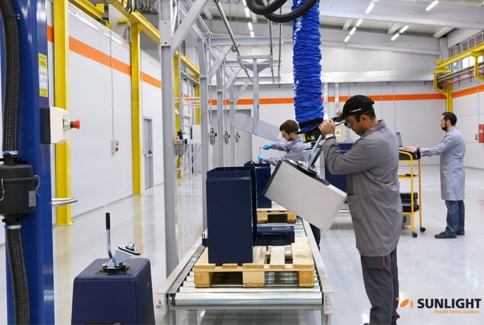
Currently accounting for 60% of the forklift energy market, battery powered forklifts are on an upward trajectory. The market is projected to reach $7.4 billion by 2026 as demand for diesel and gas powered forklifts dramatically drops due to employee welfare and environmental concerns. So, for at least 60% of forklift purchases, the type of battery selected is crucial to maximise energy and workplace efficiencies.
At present, the two most commercially affordable battery choices are between lead-acid and lithium-ion batteries. As a technology agnostic energy storage provider, we believe that the type of battery required is entirely dependent on project requirements and specifications. Here we discuss the key aspects that need to be considered when selecting lead or lithium batteries for forklift operations.
With the impetus on maintaining increased demand across warehouses, operators need to extend the use of their machinery. If forklifts are only needed for a few hours a day, lead-acid batteries will be more then capable as the capacity of one battery charge under normal energy demands should be sufficient and the batteries can be charged overnight. However, the situation is different in a multi-shift operation.
In times of high demand where more fleets are required, lithium-ion offers a more efficient alternative. High energy density coupled with quick recharge times mean that lithium-ion batteries can accommodate multiple shifts whilst also reducing idle time. At Sunlight, our Li.ON force lithium-ion batteries reach full charge in under 90 minutes, allowing for three shift operations without the need for a battery change in the middle of the working day.
The high energy density and quick recharge time of lithium-ion batteries also negates the need for a second ‘on charge’ battery, which will further reduce the footprint of a warehouse dedicated to charging forklift batteries, allowing for more space for product storage and distribution. Most alternatives to lithium will require a backup battery due to the length of time required to recharge, which utilises vital space.
Additionally, unlike other forms of batteries, the performance of forklifts will not start to deteriorate as lithium batteries run out of power.
When it comes to the lifetime of a lead-acid or lithium-ion battery it will be significantly reduced if charging cycles are disrupted or if the battery is not fully recharged or is overcharged. The use of an incorrect charger can also dramatically affect the functionality of a battery.
However, the development of features that optimise the performance and lifecycle of lithium-ion batteries as a system compared to flooded lead acid batteries means repair and maintenance efforts are considerably reduced, and in most cases not necessary at all. For instance, Sunlight’s Li.ON range features an Active Balancing mode which is employed both in the charging and discharging cycles allowing for the equal flow and receipt of energy between the cells, keeping them constantly at the same voltage to maintain a healthy state of charge.
Additionally, some lithium-ion batteries can also be connected to warehouse management systems (WMS), helping to notify warehouses of potential servicing or maintenance requirements before the performance of forklifts starts to suffer. Our Li.ON range goes one step further, and is the first range on the market to incorporate cloud access as standard and allows our network of engineers to remotely access the batteries to shut down a damaged module or increase charge significantly, reducing unnecessary downtime associated with faulty or low power forklifts.
Both lead-acid and lithium-ion batteries do have the potential to cause health and safety issues, however when handled and disposed of correctly these issues should not arise.
The biggest hazard lead-acid batteries present is sulfuric acid spills when not stored or handled correctly. By following manufacturer’s guidelines, using acid-resistant goggles and gloves when handling and ensuring the proper disposal of these substances (which should be assisted by a manufacturer driven recycling scheme) harmful spills can be avoided.
The primary safety concern with lithium-ion batteries is the risk of fires. These can happen when the higher then specified temperature increases which is caused by overcharging, deep discharging or mechanical faults. To mitigate these risks, batteries are manufactured with in-built safety measures.
At Sunlight, we ensure optimal thermal stability within our range to avoid such events from happening. Our Li.ON force range features a Battery Management System (BMS) which uses high current fuses, temperature control and monitoring against overcharging, deep discharging, and short circuiting. To provide warning against possible hazardous situation, the BMS also incorporates cloud connectivity functions which can send alerts via email and includes a maintenance diagnosis.
From a ROI perspective, lead-acid batteries are the preferred battery choice for warehouses that operate less than one consecutive shift of forklifts as the upfront cost of lead acid compared to lithium-ion is significantly lower. This is at least for now, but further developments will make lithium-ion a more affordable option.
However, when using lead-acid batteries total cost of ownership (TCO) should also be considered as this type of battery needs regular care and maintenance and requires a sufficiently ventilated room due to the gases produced during charging.
For those applications that require three or more consecutive shifts, lithium-ion batteries can be a better option. Compared to other battery options, lithium-ion batteries due to their composition require less maintenance, offer greater longevity and can improve the environmental footprint of a business, accounting for an important reduction in resulting annual TCO compared to other technologies.
If your business depends on forklifts to operate, the type of industrial battery chosen will have a major impact on the company’s overall efficiency. By assessing your operational demands and selecting a battery dependant on requirements from a trusted energy storage manufacturer you can ensure an efficient and cost-effective operation.
For further information on System Sunlight’s ranges, please visit: www.systems-sunlight.com